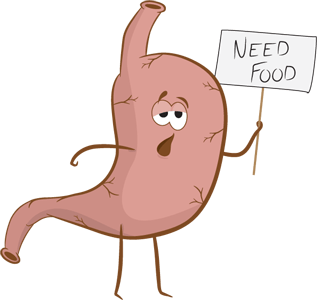Let’s face it—being in a calorie deficit can feel like you’re trying to politely decline an invitation to eat, while your stomach yells, “Are you kidding? We’re starving down here!” Hunger is inevitable, but it shouldn’t take over your life. Here’s how to know what’s normal and what needs tweaking.

Some Hunger Is Normal (No Need to Panic)
When you’re in a calorie deficit, a bit of hunger is expected. Your body’s adjusting to fewer calories, so it’s sending hunger signals to remind you of that fact. If you wake up hungry in the morning, that’s a good thing! It means your metabolism has been working overnight, burning through fuel.
But if you’re waking up at 3 a.m. with your stomach growling like a grizzly bear, something’s off. Sure, you should feel a little hungry in the mornings, but waking up in the middle of the night desperate for a snack is a sign you might need to tweak your calorie intake—especially before bed.
Hungry 24/7? Not the Plan
Hunger is part of the weight-loss journey, but it shouldn’t be your full-time companion. If you’re spending your days dreaming about food, constantly distracted by the thought of your next meal, it’s a sign your body isn’t getting enough fuel. No one should be feeling ravenous all day long—that’s more punishment than progress.
A manageable level of hunger is fine, even beneficial, because it means you’re burning more calories than you’re taking in. But being hangry 24/7? That’s your body’s way of saying, “Hey, we might have gone a little too far here.”
Waking Up Hungry Isn’t a Problem (Just Don’t Attack the Fridge at 3 a.m.)
Waking up with a little hunger is totally normal, especially in a calorie deficit. It’s like your body’s way of nudging you awake and saying, “Hey, it’s time to refuel.” It’s actually a sign your metabolism is chugging along nicely. But waking up in the middle of the night feeling like you could eat an entire pizza? Not so normal.
If you find yourself rummaging through the fridge at night, that’s a sign your calorie intake (or meal balance) may be off. Try having a more balanced meal at dinner—protein, fiber, and healthy fats—to keep you full through the night.
Skipping Breakfast Isn’t a Badge of Honor
There’s a common myth that skipping breakfast is a sign of “control” or “discipline,” like it’s some kind of secret weapon for fat loss. Let’s get real—if you’re waking up with no appetite, it might mean your hunger signals are out of sync. It’s not a flex to say, “I’m not hungry in the morning,” especially if it leads to you overeating later in the day.
In a healthy calorie deficit, your body should naturally feel some hunger in the morning. Skipping breakfast isn’t a recipe for success—it can actually set you up for those inevitable afternoon snack binges. So go ahead, have breakfast! Your body will thank you.
Maybe It’s Not the Quantity—It’s the Quality
Sometimes, hunger isn’t just about needing more food—it’s about needing better food. If you’re eating a bunch of processed snacks and empty calories, your body might be sending hunger signals simply because it’s not getting the nutrients it needs. Loading up on nutrient-dense foods like lean proteins, vegetables, whole grains, and healthy fats can keep you fuller for longer—and help you feel more satisfied without overdoing the calories.
Think of it like this: your body is a finely tuned machine, and if you’re feeding it junk, it’s going to keep asking for more because it’s not getting the quality fuel it needs to run smoothly.
The Sweet Spot: Balance, Not Starvation
Ultimately, the goal of a calorie deficit isn’t to feel like you’re surviving on crumbs. It’s about finding the balance where you’re feeling a little hunger at times—like before meals—but not so much that it dominates your day. Waking up hungry is a normal part of the process, but being so ravenous you’re up in the middle of the night? That’s a sign you need to adjust.
In conclusion: a calorie deficit should mean some hunger, but it’s all about moderation. Listen to your body, fuel it properly with quality food, and don’t let hunger turn your weight loss journey into a battle of willpower. A little bit of hunger can be a good thing, but if it’s taking over, it’s time to rethink your strategy!
